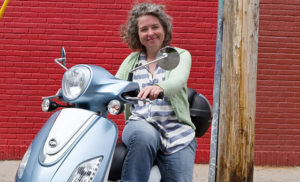 Junket owner and creator Julie Kearns asked, “How can we make this the greenest neighborhood in America? Each of us can choose to set a personal carbon consumption budget of 5 tons of CO2 emissions per year, and then use that smaller footprint as the basis to design a simpler, better life.” (Photo by Margie O’Loughlin)[/caption]
Junket owner and creator Julie Kearns asked, “How can we make this the greenest neighborhood in America? Each of us can choose to set a personal carbon consumption budget of 5 tons of CO2 emissions per year, and then use that smaller footprint as the basis to design a simpler, better life.” (Photo by Margie O’Loughlin)[/caption] By MARGIE O’LOUGHLIN
Julie Kearns is the creator and owner of Junket: Tossed and Found, a funky second hand store that was a fixture on Minnehaha Ave. for years.
In August of 2018, she and her team closed their store.
Kearns said, “We tried a space sharing arrangement with another social enterprise, but it didn’t work. While we hadn’t planned on closing, it turned out to be a positive change in the end. Junket looks different these days, but we’re very much moving forward.”
The Junket team is currently working remotely – coming together for meetings, popping up at events, and keeping their inventory organized and accessible in temporary storage. Visit www.shopjunket.com to learn more about their ethically sourced and sustainably shipped quality goods and creative supplies now available online.
Kearns said, “I knew I’d need to grieve the loss of the physical store. With time came the realization that I’d been operating in a driven state for years: through the frustration of the Minnehaha Ave. construction, and all of the changes that have hit the retail market, generally. While Junket has always been about fostering positive social change through creativity and reuse, retail had merely been the vehicle we’d used to engage with community and with each other.”
Kearns decided to change vehicles – in more ways than one.
As part of her healing process, she started to look at how running the shop had made it difficult for her to live out her own values of a low-carbon lifestyle.
Kearns said, “I felt like a hypocrite driving my two block commute every morning, but I never knew when I might need my car during the day for a pick-up or delivery.”
Once the shop was closed, she sold her car in favor of using a scooter that gets 89 miles per gallon. Between the scooter, her bicycle, two feet, and public transportation, Kearns is getting around just fine.
On the home front, Kearns and her daughter had already transitioned from a three-bedroom house to shared ownership in a cooperative and an 800-square-foot apartment in 2015.
She said, “Last year’s forced do-over came with a powerful upside: I’ve had time to strategically simplify other areas of my life to align with closely held values, and to mold the business around our lives instead of the other way around. After so many years in the public eye, this has been a welcome, more private, time of strategic thinking, pausing, and shifting.”
The Junket team right now is small and mighty.
Kearns said, “For our next chapter, we envision a community space nestled in the Longfellow neighborhood with a focus on creativity, innovation, and resilience through re-use. We envision a healthy, vibrant collaborative that offers many possibilities – imagine intergenerational skill building, consulting and classes in sustainability, making and repair, incubating low-carbon business start-ups, sales and swap events where senior citizens and down-sizers can transfer goods to those who need them, perhaps a commercial kitchen for food growers/preparers, a co-working space, and a CSA pick-up site.”
Kearns continued, “While we wait for the right space and time, we’re building a stronger base of operations online, offering carbon-informed classes and consulting, and making appearances at niche events like the Midtown Farmers Market.
“We’re using our online store to model carbon-informed commerce selling reused goods, all of which are packaged in reused materials and shipped via ground transit (which generates 10 times fewer emissions than air shipping). Having this infrastructure in place will make it easy to scale up quickly, whenever market demand and carbon constraints finally propel data-driven climate measures into mainstream economic decision-making.”
Kearns is also actively involved in the work of Al Gore’s Climate Reality Leadership Corps. A training will be held August 2-4 at the Minneapolis Convention Center (application deadline for the no-cost event is June 19). For more information go to www.climaterealityleadershipcorps.com.
Comments
No comments on this item Please log in to comment by clicking here